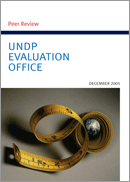Evaluation of development programmes
Evaluating multilateral effectiveness - work of the DAC Evaluation Network
UNEG/DAC peer reviews of evaluation systems of United Nations organisations
The DAC Evaluation Network and the United Nations Evaluation Group (UNEG) work together to review the evaluation functions of UN organisations. These peer reviews are conducted using a framework developed by a collaborative task team of the two groups. Organisations are reviewed on a voluntary basis - see reports below.
A peer review of the evaluation functions of an organisation is not in itself an assessment of the effectiveness of that organisation. However, it can contribute to the basis for assessing the effectiveness of the organisation, by testing the capacity and quality of the organisation’s own evaluations of effectiveness, and thus the confidence that can be placed in them. The approach builds greater knowledge, confidence and use of evaluation systems by management, governing bodies and others - providing a suitable way of “evaluating the evaluators”, sharing good practice, experience and mutual learning.
A large portion of development assistance is channelled through multilateral institutions, including UN agencies and multilateral development banks (more on multilateral aid). These institutions have their own independent evaluation departments and management boards to ensure the quality of their work. Still, given that many bilateral donors fund these institutions, there is demand from many stakeholders for more information on the institutional performance and development effectiveness of multilaterals.
|
UNEG/DAC Peer Reviews of United Nations evaluation systems - Reports |
|||
|
Professional Peer Review of the Evaluation Function of UNESCO
January 2020
This Professional Peer Review of the evaluation function of UNESCO was carried out under the provisions contained in the United Nations Evaluation Group (UNEG) Framework for Professional Peer Reviews of the Evaluation Function of UN organizations. It is the first Peer Review of UNESCO’s evaluation function and was carried out at the request of UNESCO. |
|||
|
Professional Peer Review of the Evaluation Function of UNICEF
December 2017
The assessment aimed at analysing the function against the three core principles of Independence, Credibility and Utility. The scope included both the strategic positioning of evaluation in UNICEF and its functioning at an operational level, at the central and decentralized levels. The core assessment question was: “Are the agency’s evaluation policy, function and its products: independent; credible; useful and influential for learning and accountability purposes, as assessed by a Panel of professional evaluation peers against the UNEG Norms and Standards and the evidence base?” The Peer Review was to be forward-looking, providing guidance on how the evaluation function can be further strengthened to meet emergingchallenges and opportunities both within the UN system and more broadly.
|
|||
 |
Professional Peer Review of the Evaluation Function of International Trade Centre April 2017 This professional peer review "undertakes an assessment of the independence, credibility and utility of ITC’s evaluation function, focusing on quality, use and follow-up of evaluation across the ITC to promote accountability,learning, and improvement." |
||
 |
Professional Peer Review of the Evaluation Function of the United Nations Office on Drugs and Crime April 2017 The Peer Review focused, following the standard framework, on the independence, credibility and utility of the UNODC evaluation function. The main purpose was defined as “...to help UNODC to ensure that its evaluation function is well positioned and equipped to make the best contribution to the work of the organization, and those it serves.” The Panel was also asked to assess UNODC evaluation and accountability culture and IEU’s engagement with UNEG and UN-system wide evaluation processes. |
||
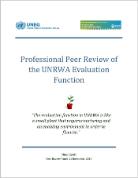 |
Multilateral effectiveness: Professional Peer Review of the UNRWA Evaluation Function report 2016 March 2016 This Professional Peer Review of the evaluation function of UNRWA was carried out under the provisions contained in the United Nations Evaluation Group Framework for Professional Peer Reviews of the Evaluation Function of UN organizations. It is the first Peer Review of UNRWA's evaluation function and was carried out at the request of UNRWA.
|
||
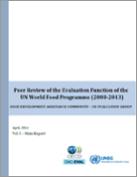 |
Peer Review Evaluation Function of the UN World Food Programme 2008-2013 - Annexes October 2014 The independent Peer Review of WFP's evaluation function was conducted to assess the independence, credibility and utility of WFP's evaluation function. In view of the many changes in WFP's internal and external context, in addition to reviewing progress since the 2007 review it assessed the quality, use and follow up to evaluations across WFP for accountability, learning and improvement. The final report sets out strategic choices facing WFP for its central and decentralized evaluation function and makes a number of recommendations to management, OEV and the board - the response to which will set the strategic direction for evaluation in WFP for the coming years. |
||
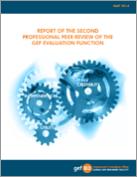 |
October 2014 The panel was impressed by what the Independent Evaluation Offic has achieved. The panel identified a number of areas that may require attention in order to harvest the full potential of the evaluation function. It found that the Independent Evaluation Office efforts to ensure the accountability function of evaluation were more successful than efforts to ensure the learning dimension. As such, the panel agrees with the Independent Evaluation Office self-assessment prepared for this review, which identified learning as the challenge for the future. |
||
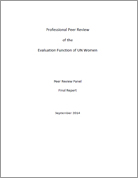 |
September 2014 This peer review report presents the panel's observations and conclusions as well as its recommendations to the Independent Evaluation Office, the management and the executive board of UN Women with a view to strengthening the evaluation function of UN Women. It focuses on communicating in succinct fashion what the panel considers to be the key overall results of its deliberations, as well its advice for further improving evaluation in UN Women. |
||
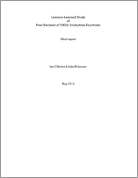 |
May 2013 This report presents the findings, analysis, conclusions and recommendations of the study of peer reviews of UN evaluation functions, which was conducted from mid-January to end of March 2013. A preface from Chairs of UNEG and DAC Evalnet is also included. |
||
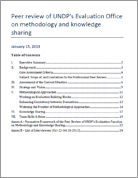 |
Peer review of UNDP's Evaluation Office on Methodology and Knowledge Sharing January 2013 The panel found that the Evaluation Office is professional and strong and has a high degree of independence. There are many good skills in the team and there is an excellent engagement with management and the board. From this strong position the Office has opportunities to further strengthen its strategic role in UNDP. |
||
 |
Peer Review of the Evaluation Function of the Food and Agriculture Organization (FAO) July 2012 The review focused on the systems and approaches for identifying, implementing, and using evaluations to the Governing Bodies; and the country evaluations and project evaluations were not examined in great detail. The review found that FAO should move to more strategic use of evaluations to the Governing Bodies, requiring evaluations to address strategic issues, focusing recommendations on strategic decisions, and broadening the evaluative base through a more consistent evaluation practice. |
||
|
|
Peer Review of the Evaluation Function of UN-Habitat
March 2012 The Review found that, generally, evaluations conducted were balanced, producing reports of good quality and that the evaluations carried out had been found to be useful. However, there is presently no Evaluation Policy in place and no clear definition of roles and responsibilities for planning, managing and conducting evaluations. |
||
|
|
|||
|
|
Peer Review of the Evaluation Function of the United Nations Environment Programme March 2012 While human resources seem insufficient to deal with the high demand for its services and to carry out mandatory project as well as strategic evaluations, the peer review panel recognized the efforts made in the last few years to strengthen the Evaluation office. |
||
|
|
|||
|
|
Peer Review of the Evaluation Function of the United Nations Industrial Development Organization (UNIDO) March 2010
|
||
|
|
Peer Review of the Evaluation function of the Global Environment Facility (GEF) 2009 The Peer Review examined the GEF evaluation function on three core criteria: independence of the GEF-EO and of its evaluation processes, credibility and utility of its evaluations. - GEF Management Response to the UNEG-DAC Peer Review
|
||
|
|
2009 -
- Management Actions Matrix in Response to UNEG-DAC Peer Review of the Evaluation Function of OIOS-IED
|
||
|
|
Peer Review of the Evaluation Function at the World Food Programme (WFP) 2007 |
||
|
|
Peer Review of the Evaluation Function at United Nations Children's Fund (UNICEF) 2006 The OECD/DAC Network on Development Evaluation designed a process of peer review of the evaluation function of multilateral organizations as an alternative to costly institutional evaluations conducted by donors. UNICEF was the second pilot following a first test with UNDP. |
||
|
|
Peer Review of the UNDP Evaluation Office
2005 Who evaluates the evaluator? Occasionally the independence, credibility and utility of evaluation are challenged both by those being evaluated and by the users of evaluation, who may often be the same. |
||
|
This framework builds on the Framework for Professional Peer Reviews developed by the collaborative task team of UNEG and the Evaluation Network (2007).
|
|||
Development effectiveness reviews
This approach to reviewing multilateral organisations was developed under the guidance of the DAC Network on Development Evaluation, with the leadership of Canada and pilot tested with the Asian Development Bank and the World Health Organization in 2010. Lessons from these reviews were used to revise the approach. At its June 2011 meeting, the Network agreed that Assessing the Development Effectiveness of Multilateral Organizations was a workable approach to assess the development effectiveness of multilateral organisations. In the evaluation of MOPAN it was recommended that this approach be integrated in MOPAN 3.0, which is now in effect.
- Development Effectiveness Review of International Fund for Agricultural Development (IFAD) 2007-2013 (2015)
- Development Effectiveness Review of UN Women 2011-2014 (2015)
- Review of the Development Effectiveness of the Inter-American Development Bank (IDB) 2008-2013 (2015)
- Assessing Multilateral Effect - Fact sheet (2013)
- Development Effectiveness Review of the World Health Organization 2007-2010 (2013)
- Development Effectiveness Review of UNICEF (2013)
- Development Effectiveness Review of the Asian Development Bank (2013)
- United Nations Development Programme (UNDP) (2012)
- World Food Programme (WFP) (2012)
Related Documents




.gif)
